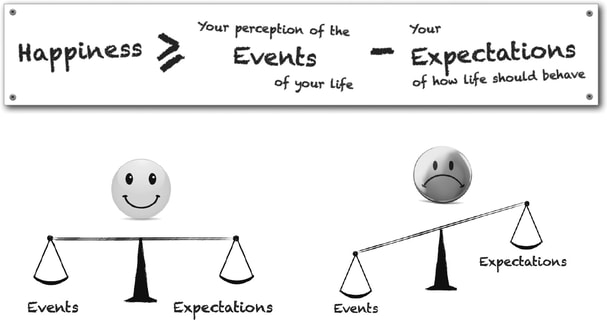|
10/8/2020 0 Comments COMPROMISE
noun
verb
Most of us do not get everything we want. We have to adapt to situations, people, changing times, and more. But to what extent?
It comes back to the point of finding a balance between what is truly important to us and what options are available to us at a given point in time. We need to have some boundaries and non-negotiables that we remind ourselves about, in every situation, if we need to decide on whether we shall be compromising on something or not. TRAVELLING
I have travelled with strangers, with family and with friends and I can confirm there have been and will be plenty of moments of compromise for the sake of not ruining the mood of the holiday and even relationships.
Family Family holidays have been happening for us since I was two years old, so I have over three decades of experience in that field. We argue about things like where we want to eat, my dad making a big deal about the lack of service at a restaurant; my mum walking into a shop in a random city and not picking up her phone. I am pretty sure they have a list of things that I do which are annoying to them too. But we still bear with it, purely because it is familiar territory and they are our family. Friends Travelling with friends is very much a learning curve for all parties involved, even if you thought you knew each other very well. The main thing that I have learnt and would suggest when travelling with friends is that you communicate clearly from the start of the trip about what each of you want to do over the days or weeks, as well as during the trip. There will be times where you need to improvise, compromise, but you will need to remember what your boundaries are as well. Ideally, you do not want to go back home after the trip not having done or seen most of the things that you wanted to, or even blame anyone else for this. This could obviously affect your friendship. If there are misunderstandings, it is best to raise them then and clarify them on the spot or soon, or else it can get worse over time. Try to be calm, adapt and compromise a bit on things that are not that important and try to have a good time. Strangers Finally, travelling with strangers may involve an element of compromise, but hopefully not to the detriment of what you need to see and do on the trip. It is your trip. Although there will be times when you may need to do what the majority of the group wants to do, sometimes for personal safety and perhaps on other times because you do not want to spend a whole day on your own. I have had days during organised tours when I needed a break from everyone. The same people that I had spent the last week or so with, was starting to annoy me. This could just be me and my occasional anti-social streak, but I do think a bit of time and space never hurt anyone, once in a while. So on one of the days in Ho Chi Minh City (a.k.a. Saigon), Vietnam, I excused myself from the travel group and hopped onto a Cyclo, which is a one person rickshaw (imagine a wheelbarrow with a cycle at the back) and saw a bit of the city myself. It was a lot of fun and in the evening I caught up with the rest of the travel group. I was very pleased to see them and hear about their day too! You can read my article on what to consider when travelling solo or in organised tours. No one is perfect. Remember to apologise and forgive and raise things that are not working during the trip, even if it is uncomfortable. If you do not do these things and let these build up in your head, things may be blown out of proportion.
STANDARDS
I could be sat in front of my laptop wondering whether I should compromise on the star ratings of the next hotel I book (for whenever my next holiday may be...) while someone somewhere is wondering if they should use money to have a meal or to repair their only pair of shoes.
People in many parts of the world still do not have basic needs or choice on things like education, consent for marriage, independence. They may have many more limitations when it comes to the types of jobs they could apply for and even be considered for, followed by being able to survive at them with the lack of acceptance in certain cultures around the world. Such people have to compromise on many things on a daily basis than most of us have to. Some people can not afford childcare, so they may have to choose between bringing up their children and a job. The reason I have brought this up is that, before we look at our compromises, based on our personal standards with magnifying glasses, we could all try to remember how fortunate we are to even have a choice. Having said that, having standards, boundaries and non-negotiables are also important for us, in order to have an element of control in our lives. Some may have overtly high standards for themselves and can come across as egoistic, proud, picky or even snobby. In many cases this could be true, especially when these individuals impose their views and standards upon the rest, without considering their personal situations, beliefs or preferences. Others may be very easy-going, to the point of forgoing many of their own desires, perhaps too often than is necessary. If we try to understand others better and keep an open mind towards different people, we can experience life more fully, where we can learn, improve and face fewer difficulties, especially when travelling with others. CAREER, PASSION AND RELATIONSHIPS
Say I was a talented dancer (sadly, I am not), and I decided to give up dancing for the sake of a relationship. It is very likely that at some point in my life I will feel regret that I gave up on something I loved, for something or someone else that I loved. As a result, I may blame the latter.
It is obviously not easy to say that I should have continued to be a dancer, no matter what, because perhaps at a certain point in time I did not have the choice, or I had to pick one thing over the other and I made an informed and practical decision then. Dilemmas can be life-changing, especially when we need to make difficult decisions. One way of dealing with these could be to think of a short and long term plan, with pros and cons of both, drawing non-negotiables for now and the future. And in case we regret our past, there is always a way to see what good came out of that, and see how we could make changes in future to do more of what we are passionate about. Obviously we need to take into account all the variables, such as our age, physical and mental abilities, dependents and more. For instance, an aspiring footballer would struggle to fulfil his passion and dreams to play his best game if he starts playing at the age of 30. It could just be the harsh truth of life that we have to choose and we can not have everything, and so we have to compromise. If you make choices because of someone else, be it family or societal pressures, you are quite likely to blame them down the line and feel angry about it. Ultimately, the goal is to be as sure as possible that whatever choices we make, we will try not to hold anyone accountable for the compromises involved, but ourselves. WHAT IS AT STAKE?
Whether this is at a fish market, a car dealership or for big business deals, we have all had to question how much we could let go of. What are the opportunity costs of one thing to another? What is at stake?
Our thought process is affected by many factors, such as our:
TOP 5 THINGS TO REMEMBER:
As a takeaway from this article, some things to consider when you are faced with a situation where you need to compromise:
0 Comments
3/8/2020 0 Comments TURNING POINTSTurning point noun A time at which a decisive change in a situation occurs. We often recall past moments or phases of our lives when something happened, that may have affected the way we think, the way we are or even our life situation. Examples of changes could involve anything from relocation, meeting new people, starting or ending friendships or relationships, changes in our overall health and so on. Change is inevitable, and arguably some momentum could be good for us to make the most of our lives on Earth. But often, we could find ourselves powering through changes and not always reflecting on what we gained from them. How did we grow from an event? Did we learn anything? Did something about the direction of our life, our way of thinking, or who we are, change after these turning points? As mentioned by Mo Gawdat, a former Chief Business Officer at Google [X], there's something he calls the "butterfly effect" which stuck with me. It's about looking at all the events and interactions with people and turning points as the reason why we are where we are today (including "negative" ones). For example if it wasn't for that bully in school who said you weren't 'cool' enough, you wouldn't have worked on building up your courage and strength to accept yourself as you grew up to make you the self-assured and confident adult that you may be today. So even negative events could result in turning points in say, your attitude towards yourself or your life, which could be a positive outcome. LIFE EVENTSSometimes we could look at (gradual or drastic) life events as turning points. Everyone defines a ‘life event’ differently, relative to the level of importance they give it and perhaps the impact these would have had on themselves. Life events which leave us with positive feelings such as: joy, confidence, excitement, gratitude are those that we remember as good events, such as the first time we plucked up the courage to travel with others or solo, decided to climb a mountain, jumped off a plane (with a parachute...) and event milestones like big birthdays, having a baby, getting married, graduating, driving your first car, and so on. This is not to say that events or phases of our lives that were less pleasant can't have positive outcomes. A serious accident followed by a recovery could be a wake up call to appreciate being alive, as well as the appreciation and importance we should give to our health and wellbeing. Feeling unappreciated at work and not being challenged or fulfilled could eventually make us rethink our self-worth, purpose and could help us realise what we really want (or don't) in our careers and our lives in terms of health, wealth, impact, creativity, collaboration, etc. Failure could make us realise that we probably aren't super-humans after all, and it’s okay to be imperfect or not be able to achieve and do everything as long as we gave our best shot. Rejection, despite the initial pang of pain, could make us accept that everyone is different and often the right thing (or person, or job, etc.) for us could be out there. Mistakes made today could teach us lessons on how to avoid bigger mistakes in future (but obviously we should try to not repeat them). VICTIM MINDSETI was in Nairobi, Kenya sat at a bar with one of my best friends talking about my past hang ups about all the people who hurt me and everything that happened that was slightly unfair on me and how it still affects me. As you may notice from this, is that I was talking about me like I am the only person who is affected by situations. Often we may look at ourselves as 'stars' of the show (a.k.a our lives), but we should try to remind ourselves that such turning points in life also involve others, who may have also been affected. We should also remember that we could have had a part to play in these situations and we may have also hurt people (knowingly or unknowingly). My friend rightly pointed this out to me then and there, after listening to me 'rant'... and I had a wave of realisation then, that I am not the only one in this 'show'. Vicki Botnick, a licensed marriage and family therapist (LMFT), explains that sometimes people can “veer into the belief that everyone else caused their misery and nothing they do will ever make a difference.” This leaves them feeling vulnerable, which can result in difficult emotions and behaviours. Ideally, we should learn how to take responsibility for our own lives, accept the outcomes of events and find solutions for ourselves (rather than sit there, helplessly blaming others). Vicki Botnick recommends the book “Pulling Your Own Strings.” UNEXPECTED EVENTSThere have been a good number of times when I remember thinking about the long term impact of unexpected events from terrorist attacks, pandemics, natural disasters, death of loved ones or inspirational people, or even economic events like the financial crisis in 2008. Anything and everything that is or was unexpected, could help us build resilience in terms of continuing our journeys in life, to the best of our abilities and learning to be adaptable and accepting of situations. When we look back at such events and phases of our lives, I hope we can try to keep the lessons learnt and apply them as often as we can. Since the pandemic, for instance, many of us really understood what and who matters to them the most. Obviously there have been other implications, which may not be very positive, such as social anxiety, dealing with inequality, rising costs of living, dealing with loss, but in the words of the Disney's musical Frozen 2 is to do "The Next Right Thing”. CONVERSATIONSWe have many standards in our multiple societies around the world: how we look; what careers we should have; if we should be married; if we should have children; how we speak; what we possess; what we achieve; what or who we follow or believe in (sports, religion, politics).
Some of us may even believe that we’ve had a hard life until we hear someone else’s life story, or get some inspiration about what we can do differently with our own lives. Sometimes just a conversation with someone could be a turning point for the way you think and act afterwards. My trip to South America in my mid-twenties was a bit of a turning point for me. Most of the locals embraced their bodies in all shapes and sizes. I saw the largest people in the smallest swimsuits, dancing and sipping on Caipirinhas having the best time. Obviously the message isn't about having unhealthy habits like over indulgence in food and alcohol, but the message is more in accepting ourselves. In Peru, I tried to converse with a woman selling Alpaca wool scarves in my very basic Spanish, who mentioned how she earns money from selling these scarves to tourists so that she can fund her children's schools and see them once or twice a month. This made me appreciate that people deal with distance between loved ones differently, and how grateful I was to spend time with them (on video / phone calls / messages or in person). One final example was when my mother and I were walking on the streets of Kolkata, India and we were hungry (we tend to use the term 'starving' too loosely). We saw a tea stall on the road side, where a small old lady, draped in a simple sari was taking a lunch break from making tea for passing customers. She quickly stopped eating and served us immediately (a small clay pot of tea costs around 2 pence), when we noticed what she was eating: just about two tablespoons of some black seeds on a banana leaf. My mind immediately raced to just how much we eat and take for granted - in terms of portions as well as how much money we spend on food. My daily cappuccino in London costs me around GBP 2.50 (sometimes more), which is 125 times more than what I paid this lady for a cup of tea. This is just to give some perspective, rather than instill guilt in us... the point being, this one moment was like a turning point for me and I do try to remind myself that we should appreciate what we have and be grateful for it all, as many people have much less. These conversations while traveling, have acted as reasons for me to think differently and have potentially been turning points for me. I hope you can also think of such encounters or phases or events in life that may have had an impact on you today. |
Home |
Categories |
|



 RSS Feed
RSS Feed